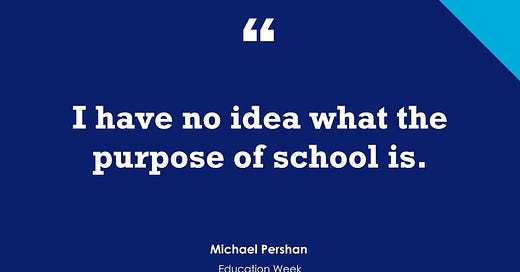This piece originally ran in Larry Ferlazzo’s column in Education Week. Larry runs a cool column over there, where he asks teachers a bunch of questions that people don’t usually ask teachers. I don’t remember what Larry’s original question was, but I hope it was about the purpose of school, because that’s what I ended up talking about.
I have no idea what the purpose of school is. I don’t even know if I’m supposed to know what the purpose of school is. Is it to prepare students for college? For work? For voting? For life?
This can be a pie-in-the-sky philosophical question, but sometimes, it’s a practical one. There are all sorts of extremely tangible value conflicts that appear in daily school life. Do we push the class to focus a bit more on test prep, even if they hate it? Do we hire a reading specialist or an art teacher with the available funds? Should students repeat the grade or be socially promoted?
Value conflicts are lurking behind some of the most perennially controversial issues in teaching. How much homework do kids need? Should we track? How do we grade? Nobody can agree because we’ll never be on the same page about school’s purpose.
If absolutely put on the spot, I’d say that school does all and none of the things people want it to. Schools are compromise institutions, built out of our attempt to navigate conflicting expectations. We emphasize core subjects not because they satisfy some particular purpose of schooling but because they represent agreement amid the conflict, like an overlapping region in some giant Venn diagram of values.
Researchers have begun to find ways to tease apart some of these purposes, so we have a better picture of the choices and tradeoffs. One recent study, for example, found a conflict between teaching styles in elementary classrooms: Some teaching was associated with greater mathematics learning, while other styles went along with higher enthusiasm and engagement with school. Which is more important in the long run for a young student, learning or engagement with school? Hard to say.
In another study, using data from Trinidad and Tobago, one group of researchers found that parents make value choices when ranking schools. At the top of some lists were schools that tend to prepare students well for high-stakes tests. Others put at the top of their list schools that excel at promoting healthy life outcomes. I suspect in wealthier countries, too, parents disagree about what they most want schools to excel at.
So, what can we do? Because conflicts are inevitable, and because navigating them is an important part of our work, every school should be looking at more than just test scores. We need to understand that, at times, maximizing learning is in tension with other valid goals of education. And to the extent that schools are evaluated, a wider range of variables—like student satisfaction, attendance, behavior—should be considered. We need everyone involved in education to understand that, as long as we disagree about the purpose of schooling, great schools can be excellent in different ways.





I would agree that schools are compromise institutions. There are so many competing requirements that deciding what a school is there to do is a dilemma, not a puzzle. If nothing else the pandemic made it very clear that for most of modern western society, school is tax-funded daycare. It's also very productive daycare as it educates. But then inevitably things get tricky. If you look at school mission statements they nearly always demonstrate how muddled the thinking behind purpose is. When I am in one of my more grumpy moods I will often suggest that what we exclude is as indicative of what we value as what we include. But that act of editing our sincerest hopes is difficult. Similarly, if you really name your school values, then inevitably you will come to a moment when something in day-to-day practice is antithetical to those values. As a school administrator I think those are some of the most interesting and challenging conversations I find myself in.
Would people be happier if parents and schools were able to match with each other based on their values? We can see this to some extent with parochial schools, but they're on the margins of the wider schooling world.